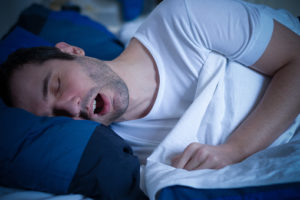Do you snore loud, have morning headaches, or wake up frequently in the night? If so, then you may have a condition known as sleep apnea. Sleep apnea can be a potentially serious disorder where breathing repeatedly stops and starts during sleep. The main types of sleep apnea are obstructive sleep apnea, central sleep apnea, and complex sleep apnea syndrome. Obstructive sleep apnea is the most common form and occurs when the throat muscles relax. Central sleep apnea occurs when the brain does not send proper signals to the muscles that help control breathing. Complex sleep apnea syndrome is also known as treatment-emergent central sleep apnea and occurs when someone has both obstructive sleep apnea and central sleep apnea. Factors that may increase the risk of obstructive sleep apnea are excess weight or obesity, thicker neck circumferences, being male, older adults, family history, use of alcohol or sedatives, smoking, and nasal congestion. In central sleep apnea, risk factors include middle-aged and older adults, male, have congestive heart failure, use of opioid medications, and history of having a stroke.
Symptoms of Sleep Apnea
It is often difficult to determine which type of sleep apnea you may have. The most common signs and symptoms of sleep apnea include: loud snoring, episodes of breathing cessation during sleep, gasping for air during sleep, awakening with a dry mouth, morning headaches, difficulty sleeping, excessive daytime sleepiness, difficulty paying attention when awake, feeling irritable or depressed, and memory or leaning problems.
Complications of Sleep Apnea
If sleep apnea is left untreated or un managed, there are complications that can occur. You can have daytime fatigue because of the repeated awakenings during sleep and feel irritable with difficulty concentrating. Sleep apnea can cause dry mouth that may lead to oral and dental health issues. Sleep apnea can also lead to high blood pressure and heart problems, type 2 diabetes, other metabolic syndrome, and liver issues. Sleep apnea not only affects you, but also your significant other or those who sleep near you. The loud snoring can keep others awake and disrupt their sleep as well.
Diagnosis and Treatment of Sleep Apnea
Sleep apnea can be diagnosed by a doctor based on your signs and symptoms and a sleep history with various sleep testing. Our professionals at California Dental Group have specialists who are experts in sleep apnea who can help with diagnosing the disease. The sleep apnea specialists will be able to determine the severity of your sleep apnea and recommend a treatment. For mild cases of sleep apnea, lifestyle changes such as losing weight or quitting smoking may be recommended. For moderate to more severe cases, air pressure delivery devices and masks, oral appliances, or surgery may be recommended. Give us a call at 800-407-0161 to schedule your appointment and sleep apnea evaluation with us.


